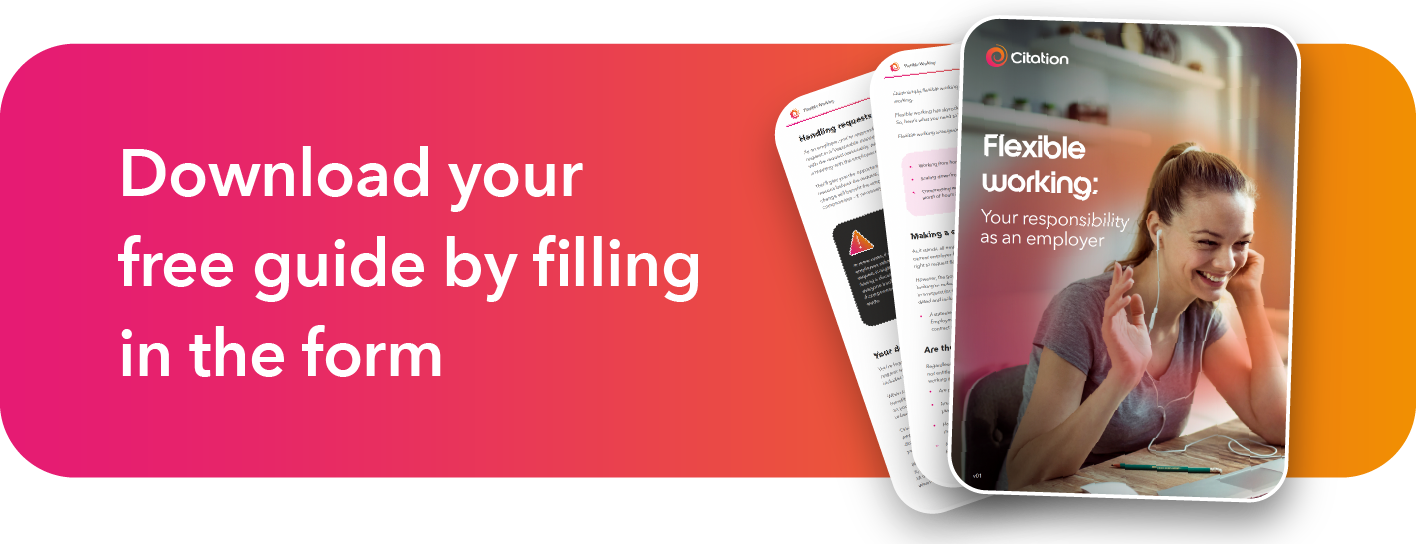Flexible working: your responsibilities

Flexible working: Your responsibilities as an employer
Flexible working has become a workplace essential rather than a nice-to-have. Since the pandemic, it’s soared in popularity — and with new legislation making flexible working requests a day one right, it’s something every employer needs to understand.
But what does that mean for you, and how can you manage requests fairly while keeping your business running smoothly? Our HR & Employment Law experts have created this free guide to help you navigate your responsibilities under the Employment Relations (Flexible Working) Act 2023 and the new ACAS Code of Practice.
In this FREE guide, you’ll learn:
- What the latest Employment Relations (Flexible Working) Act 2023 means for employers
- How to handle flexible working requests fairly and consistently
- When and how employees can make a flexible working request
- The eight fair reasons for rejecting a request
- How to update employment contracts following flexible working changes
Key highlights from the guide:
1. What counts as flexible working?
Flexible working can take many forms, from hybrid working to job sharing. Some of the most common examples include:
- Working from home full-time or part-time
- Moving from full-time to part-time hours
- Compressed hours (e.g. five days’ work in four days)
- Staggered hours to fit around commitments like the school run
- Job sharing or annualised hours
2. Making a flexible working request
Under the new legislation, employees will soon have the right to make two flexible working requests in any 12-month period, and they’ll be able to do so from day one of employment.
A valid request must be:
- In writing and dated
- Stated as a formal request under the Employment Rights Act 1996
- Include details of any previous requests and the proposed start date
While there are exceptions (for example, armed forces or agency workers), most employees now fall under this new right — so it’s important to be prepared.
3. Handling requests fairly
Employers must deal with requests in a reasonable manner. That means:
- Holding a private meeting to discuss the request
- Allowing employees to bring a colleague along
- Considering how the change could benefit both parties
- Consulting on options before rejecting a request
You’ll need to respond to a request within three months (soon to be reduced to two months under the new Code of Practice).
4. When and how you can turn down a request
You can only reject a flexible working request for one of eight fair business reasons, including:
- The burden of additional costs
- Inability to reorganise work or recruit extra staff
- Detrimental impact on quality, performance, or customer demand
- Lack of sufficient work during proposed hours
- Planned structural changes
5. Updating employment contracts
Once a flexible working request is accepted, it creates a permanent change to the employee’s terms and conditions. You’ll need to update their contract of employment or issue an addendum, clearly outlining:
- The employee’s new working pattern
- The date the change takes effect
- Signatures from both parties
It’s also worth remembering that flexible working doesn’t affect statutory rights like redundancy pay, unfair dismissal protection, or holiday entitlement.
Why managing flexible working requests properly matters
Managing flexible working well helps you stay compliant with employment law, and it’s great for your people too. When employees feel supported and trusted, they’re more engaged, productive, and loyal.
By taking a consistent, fair approach to requests, you’ll build a happier, more motivated workforce while protecting your business from potential tribunal claims.
Make flexible working simple with Citation
Flexible working laws can feel complex, but with Citation, they don’t have to be. Our HR & Employment Law experts are here to make it easy for you to manage flexible working requests and stay compliant with the latest regulations.
We’ll help you handle requests fairly, update employee contracts, and put clear policies in place. Plus, with access to our Atlas HR platform, you’ll have all the templates, tools, and expert advice you need in one place.
Ready to get started? Download your free guide today and take the stress out of managing flexible working.
Download your free guide now
Simply fill in your details to get your free guide on flexible working and learn how to confidently manage requests in line with the latest legislation.
Need more help? Contact Citation’s experts
If you’re unsure about flexible working or want support putting policies in place, our experts are here 24/7 to help.
Call us on 0345 844 1111 or fill out the form to request a callback. Let’s make flexible working work for your business.24, find out all you need to know about your flexible working responsibilities as an employer in our free guide.
Download your guide!
Already a client? Head over to Atlas for our exclusive client-only content.






